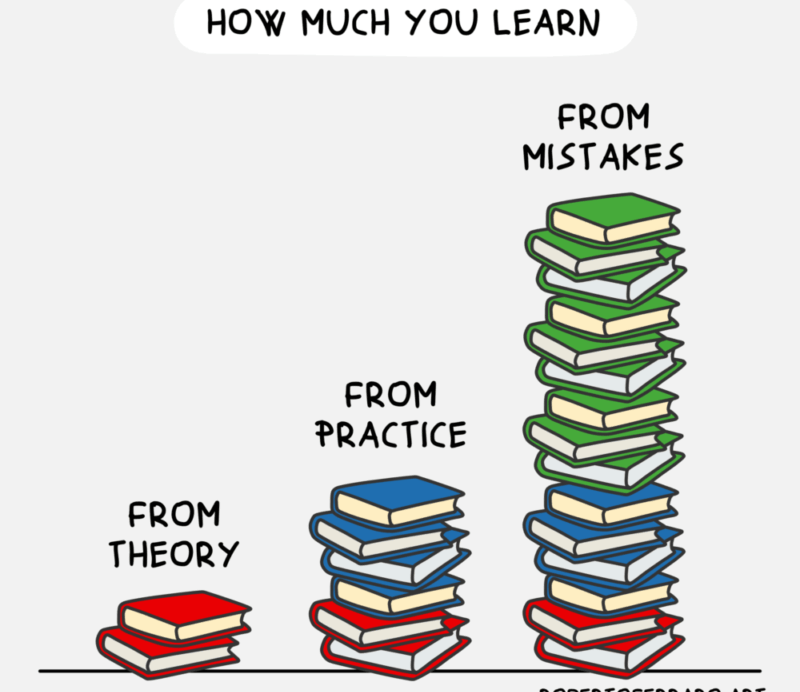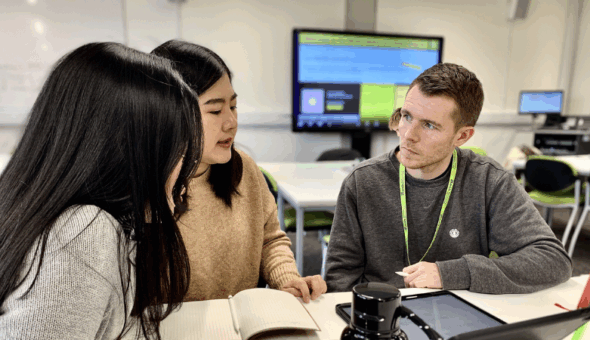Making mistakes can feel bad, but they are just a natural part of learning. Ben McGovern from the Mathematics Resources Centre (MASH) explains how to shift your perception on making a mistake.
For many students, maths can feel like an intimidating subject. Whether you’re trying to rearrange an equation, choose the right statistical test, or interpret data, there can often be a lingering worry about getting things wrong.
But here's something that is not emphasised enough - there's nothing wrong with going wrong! Mistakes, as much as they might feel frustrating or embarrassing in the moment, are at the heart of doing maths. They’re not just bumps in the road; they’re part of the road itself, guiding us to a better understanding. They show you’re engaging with the material, testing out ideas, and actively doing, rather than simply ‘learning’ maths. This process is far more valuable than simply arriving at the right answer.
Why do mistakes feel so intimidating?
The fear of making mistakes often stems from early educational experiences where maths was presented as a subject of precision and right-or-wrong answers, leaving little room for error. When accuracy is rewarded and errors are penalised, it can be a discouraging experience, often leading to a lasting dislike, or in some cases, anxiety towards maths.
But despite its apparent unforgiving nature, maths is not just about getting the right answer (I promise!). When you feel like you’re allowed to make mistakes, it creates space for curiosity. Instead of worrying about whether your answer is right or wrong, or whether your question is “too easy”, you have permission to just have a go. This change in attitude can be incredibly freeing and in a lot of cases, a real relief.
The role of maths at university
A lot of the time, the maths you studied at school can feel quite abstract without any obvious real-world applications. It reinforces the idea that maths is just memorising formulas (does anybody really need to know trigonometry?), often feeling complicated just for the sake of it.
At university however, the role of maths changes. For students in subjects like engineering, economics, psychology and the life sciences, maths can become a practical and powerful tool. By being able to take a real-world problem and understand that it can be simplified, explored, and solved using the same skills you were previously taught at school, can suddenly make a rigid subject feel useful and much more hands-on.
What to do when the maths gets hard
When the maths gets hard, shifting your perspective on mistakes can make all the difference. Here are some strategies to help:
- Break problems down: Approach problems step by step. If you hit a stumbling block, focus on what you understand so far and take time to identify the issue
- Ask for help: Discuss concepts with peers, speak to tutors, or attend support sessions. Reflecting on mistakes with others can bring clarity and show you’re not alone in facing challenges
- Keep mistakes in perspective: Don’t let small errors overshadow your overall understanding. Forgetting a minus sign or misremembering a formula doesn’t mean you’re incapable
- Focus on progress: Each mistake you address is a step forward. They’re not setbacks but essential moments of growth that deepen your understanding
By adopting this mindset, maths becomes less about perfection and more about exploration. Mistakes, instead of being feared, become valuable tools for building confidence and skill.
Produce a clean copy
When you try solving your maths problems you might end up with a page of crossings out, backtracks, and somewhere hidden at the bottom, an eventual answer. It can be very helpful to go through your workings and write out a neater, mistake-free version as this will reinforce the correct steps to take and methods to use. Remember, the solution in the back of the book started its life as a mess of backtracks and crossing out too. Don’t throw away the originals, it can also be helpful to keep the first version too; having a reminder of the work you put in to solve the question and learning which methods didn’t work is equally as important.
Try something easier!
Sometimes it can help to solve a simplified problem first. For example, could you try a special case of your problem that works in one dimension rather than three.
A final thought
For anyone who needs to use maths as part of their degree—whether it’s interpreting results, solving problems, or running calculations—remember that mistakes are integral to the process. There’s nothing wrong with going wrong.
Mistakes are not just part of learning; they’re part of doing maths. They show that you’re trying, thinking, and pushing yourself to understand something new. This is where real progress happens. So, approach maths with curiosity, patience, and a willingness to stumble along the way. Keep exploring, keep experimenting, and learn from what goes wrong.
Respond



